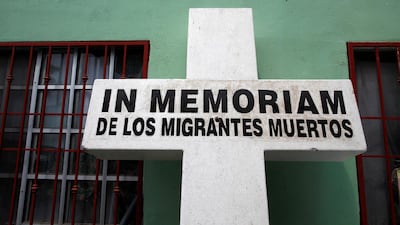The number of migrants dying from extreme heat on the US-Mexico border rose 55 per cent in the past nine months, after an increase in unaccompanied children and families trying to enter the United States illegally, the US government said on Monday.
Heat-related deaths, the main cause of migrant fatalities on the US south-west border, rose to 48, up from 31 over the same period in 2017, said US Customs and Border Patrol spokesman Salvador Zamora.
The death toll is expected to rise further in the triple-digit heat of summer months, as vulnerable immigrants attempt to cross harsh environments, putting border fatalities on track for a year-on-year increase in 2018, Mr Zamora said.
The Border Patrol recorded a 12 per cent year-on-year rise in immigrant arrests in the eight months to May 31, he said.
“We are geared up to surpass last year’s heat-related deaths and the summer is just beginning,” he said in a telephone interview. “The demographics of the illegal aliens we are apprehending, the family units, the unaccompanied children, they’re a lot more vulnerable.”
Humanitarian groups such as the Border Angels say the main cause of rising deaths is tighter border security and law enforcement, such as the recent imposition of a "zero-tolerance" policy for illegal border crossers. This has prompted migrants to make long treks through hostile terrain via remote crossing points.
"We've seen people crossing in more dangerous areas, so even though there's less people crossing, there are more people dying," said Enrique Morones, founder of Border Angels, whose volunteers leave water for migrants.
Until four years ago, the vast majority of migrants arrested at the border were Mexicans. With improved economic conditions in Mexico, their number has fallen, as have overall arrests on the border, which dropped to 303,916 last year, down 26 per cent from 2016, according to Border Patrol data.
Immigrants from Guatemala, Honduras and El Salvador now top the list of people arrested at the southern border, as gun and gang-related violence drives an exodus from those countries, according to US government data.
As the number of arrests on the border have fallen, the United Nations International Organisation for Migration has recorded a rise in migrant deaths for the past four years, with the total reaching 415 last year.
Immigrants, including children, from sub-tropical and mountainous areas are arriving at the border poorly nourished, unacclimatised to arid conditions and susceptible to heat-exhaustion, Mr Zamora said.
Families apprehended at the border increased five-fold since 2013, while the number of unaccompanied children detained last year was almost double that in 2010, according to Border Patrol data.
Mr Morones suspects patrol agents of destroying water supplies that the group drops off for migrants in the desert. One such act was caught on video in Arizona by another humanitarian group called No More Deaths.
Mr Zamora said actions shown in the No More Deaths video were “unacceptable” and in no way representative of the agency’s values. The agency conducts its own humanitarian rescues, which rose slightly to 748 people in the eight months through May, he said.

